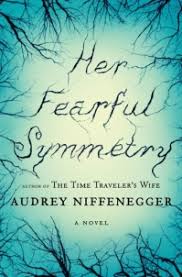
Recently I devoured Audrey Niffenegger's new novel, Her Fearful Symmetry. I was nervous before I began because I really enjoyed The Time Traveler's Wife and the new book was getting mixed reviews. Well, I am happy to report that I actually enjoyed Her Fearful Symmetry (herein, HFS) even more than The Time Traveler’s Wife (herein, TTW).
The reason I enjoyed the newer novel more and others disagree has to do with the difference in the appeal of each novel. The overall tones of these novels are on opposite ends of the spectrum. TTW is a love story with a science fiction element and a heart-warming ending. (click here to read my full report on TTW).
On the other hand, HFS is a dark ghost story about deep family secrets with seriously twisted characters and an unsettling ending. I loved it! But this huge shift in tone, mood, and storyline focus can easily explain why fans of the more heartwarming TTW were disappointed. Whereas Claire and Henry in TTW are good, well meaning, loving people, the main characters in HFS are manipulative, selfish, and mean.
Without giving anything away, here is the basic plot. Edie and Elspeth were identical twins growing up in London, Edie married and moved to the Chicago Suburbs and had twins of her own, Julia and Valentina. When Elspeth dies in London, she leaves her flat, overlooking Highgate Cemetery to the twins with the condition that their parents don't come over the ocean with the girls. However, Elspeth finds herself a ghost, stuck in the flat and eventually figures out how to communicate with the girls. Elspeth's lover, Robert, and the upstairs neighbor, Martin (who has a serious case of OCD), are also key to the story.
But there are many twists and turns through this story and at the end, there is one HUGE plot twist that makes the book even darker and more sinister. Again, I liked that, but it is not for everyone.
Appeal: This is a complex, character-centered, gothic tale told in a modern setting. With its focus on death, family betrayal, mental illness, and cemeteries, the novel is shrouded in a darkness of tone and mood that rarely lifts. But HFS is also filed with lyrical language, beautiful scenes, and amazing passages that beg to be read a second, or a third time. TTW, the sequel, this is not.
3 Word That Describe This Book: dark, twins, character-centered
Readalikes: HFS is very similar to a few other books I have read and loved. The Graveyard Book by Neil Gaiman, The Thirteenth Tale by Diane Setterfeld, The Good Thief by Hanah Tinti and A Brief History of the Dead by Kevin Brockmeier.
Also, use this link for my report on my book discussion on The Stolen Child for a longer list of books that are similar to HFS.
Books about Highgate Cemetery, London travel guide (the twins use them when they first move to London), books about twins (especially those trying to have separate lives), and books about ghosts could all be of interest to readers after finishing HFS.
The reason I enjoyed the newer novel more and others disagree has to do with the difference in the appeal of each novel. The overall tones of these novels are on opposite ends of the spectrum. TTW is a love story with a science fiction element and a heart-warming ending. (click here to read my full report on TTW).
On the other hand, HFS is a dark ghost story about deep family secrets with seriously twisted characters and an unsettling ending. I loved it! But this huge shift in tone, mood, and storyline focus can easily explain why fans of the more heartwarming TTW were disappointed. Whereas Claire and Henry in TTW are good, well meaning, loving people, the main characters in HFS are manipulative, selfish, and mean.
Without giving anything away, here is the basic plot. Edie and Elspeth were identical twins growing up in London, Edie married and moved to the Chicago Suburbs and had twins of her own, Julia and Valentina. When Elspeth dies in London, she leaves her flat, overlooking Highgate Cemetery to the twins with the condition that their parents don't come over the ocean with the girls. However, Elspeth finds herself a ghost, stuck in the flat and eventually figures out how to communicate with the girls. Elspeth's lover, Robert, and the upstairs neighbor, Martin (who has a serious case of OCD), are also key to the story.
But there are many twists and turns through this story and at the end, there is one HUGE plot twist that makes the book even darker and more sinister. Again, I liked that, but it is not for everyone.
Appeal: This is a complex, character-centered, gothic tale told in a modern setting. With its focus on death, family betrayal, mental illness, and cemeteries, the novel is shrouded in a darkness of tone and mood that rarely lifts. But HFS is also filed with lyrical language, beautiful scenes, and amazing passages that beg to be read a second, or a third time. TTW, the sequel, this is not.
3 Word That Describe This Book: dark, twins, character-centered
Readalikes: HFS is very similar to a few other books I have read and loved. The Graveyard Book by Neil Gaiman, The Thirteenth Tale by Diane Setterfeld, The Good Thief by Hanah Tinti and A Brief History of the Dead by Kevin Brockmeier.
Also, use this link for my report on my book discussion on The Stolen Child for a longer list of books that are similar to HFS.
Books about Highgate Cemetery, London travel guide (the twins use them when they first move to London), books about twins (especially those trying to have separate lives), and books about ghosts could all be of interest to readers after finishing HFS.









No comments:
Post a Comment